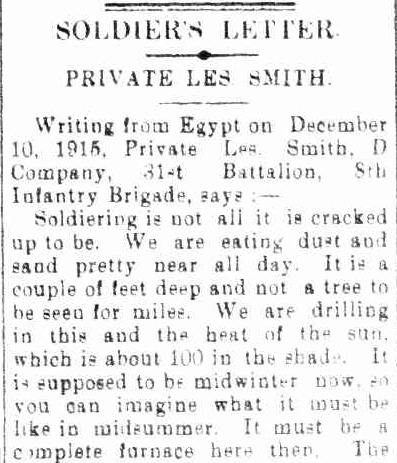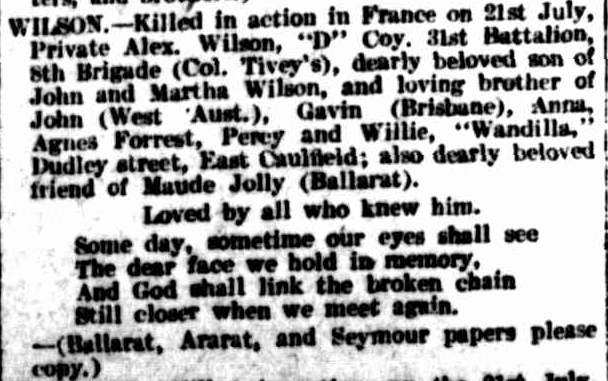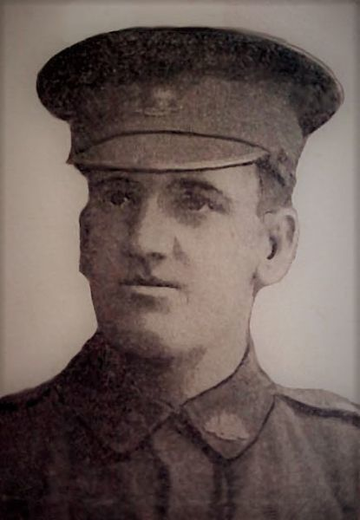
Alexander WILSON
Eyes brown, Hair light brown, Complexion fair
Alexander Wilson - Coachbuilder
We acknowledge with thanks the story, photos and research by Amanda Bentley published on the Facebook page, Ballarat & District in the Great War. The following story is largely a reproduction of her work with some editing and additions to highlight the Fromelles aspects of Alex Wilson’s story.
Alexander Wilson was born to John and Martha (nee Sleeth) Wilson in August 1894 in Brighton Beach, a suburb of Melbourne. John and Martha had six other children - John, Gavin, Anna, Agnes, Percy and William. John had been a Victorian Railways locomotive foreman and worked in Melbourne, Ararat, Seymour and Ballarat.
By 1908 the family was living in Port Melbourne and Alex was in the junior cadets at the Port Melbourne State School. The family moved again in 1909, this time to Ballarat where Alex began an apprenticeship as a coach builder in 1910 with L.E. Cutter & Co. Alex would have been a part of their transition from coachbuilding to motorcars.
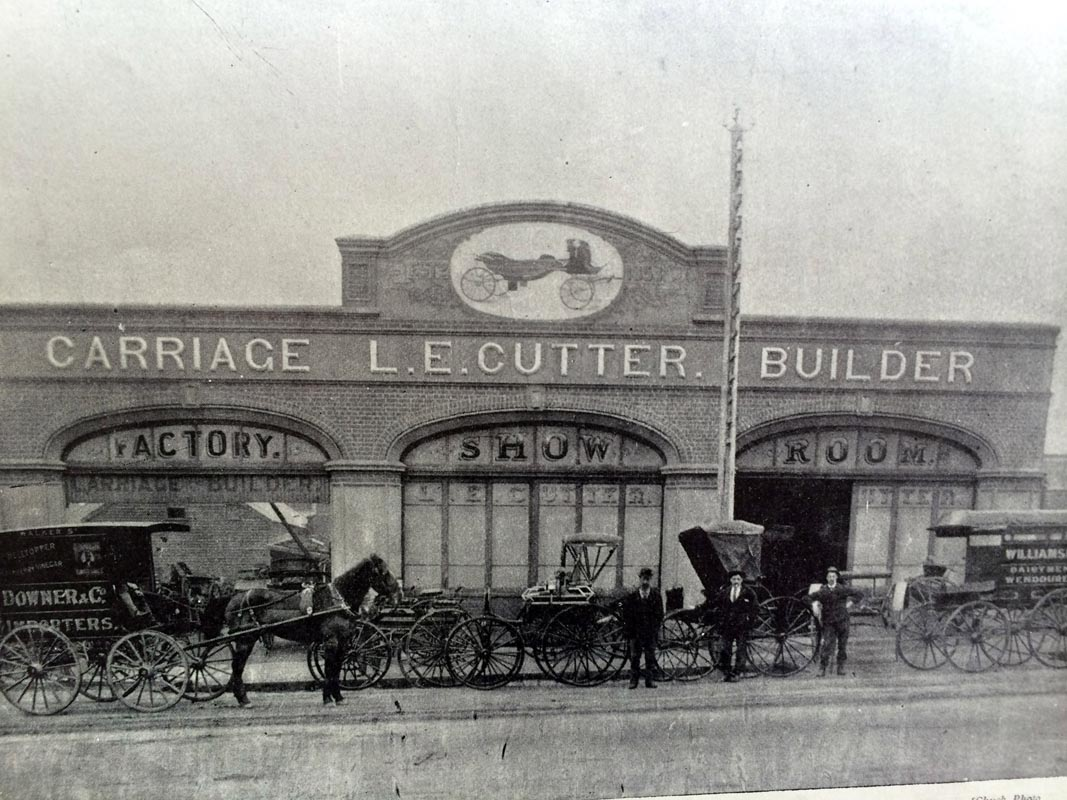
In addition to his work, Alex led an active life in Ballarat. He was a member of the Wendouree Rowing Club and the Ballarat Harriers. Rowing sculls and quads, Alex participated in multiple events including the Witter Cup (off scratch) and represented Cutters in the competition amongst local trades and businesses for the J. T. Walker silver cup. Rowing in the number 2 seat, Alex was teamed up with Teddy Muir, one of the best rowers in Ballarat. While he would have been new to rowing, he was cited in the local paper as having “the makings of a first-class oarsman.”
Source OARSMEN—HEROES ALL! (1916, October 25). Winner (Melbourne, Vic. : 1914 - 1917), p. 9. Retrieved March 18, 2022, from http://nla.gov.au/nla.news-article154555119
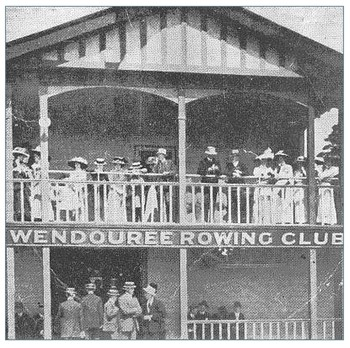
At the Ballarat Harriers, Alex would have befriended Frank and Herb Collins (see their separate stories on this website). All three of them enlisted at the same time and served in the 31st Battalion at Fromelles.
The Wilson family worshipped at the Church of Christ in Dawson Street, and it was there that Alex met young Maude Jolly, who was already an accomplished accompanist playing for the children in the Sunday school class.
Along with his sporting interests, Alex was a member of the Ballarat Young Men’s Christian Association taking part in the group’s myriad of community-based activities. He also built on his early military training by joining the 71st (City of Ballarat) Infantry Regiment, where his hard work resulted in him receiving a commission to lieutenant.
He certainly seemed to have his life in order, but the call to War was strong.
Enlistment, Training and Off to Egypt
Alex was sworn in on 14 July 1915 and went into training at the Flemington Depot camp on 19 July, along with the Collins brothers. The three of them were assigned to D Company of the newly raised 31st Battalion.
The 991 soldiers of the 31st sailed from Melbourne on 9 November aboard the troopship Wandilla, stopping briefly in Fremantle on the way to Egypt.
Just out of sight of their homeland, several Ballarat boys partook of what was rapidly becoming a tradition for departing troops: they wrote a note, placed it in a bottle and threw it into the ocean:
…Will the finder of this card kindly forward same to "The Ballarat Courier," Ballarat, Victoria. Appended are the names of some Ballarat boys in D Coy, 31st Battalion, 8th Brigade, and the boat is just leaving Fremantle now en route for the front.
A.Wilson, J. Allisey, C. C. Coutts, H. E. Brittain, C. Greenaway, F. A. Collins, W. Hicks, J. Lyons, J. P. Garvey, C. W. Tucker, F. Rawlings, Bert Wallace, H. A. Collins, and H. Phillips. All the above are in good nick for Turks or any others…
Evander McMillan of Beaconsfield, Western Australia discovered this message, written on a YMCA postcard and inserted into a ‘French glass fruit bottle,’ at Robb's Jetty. He complied with the request and forwarded the card to the newspaper. Source Ballarat & District in the Great War Facebook post – Collins brothers, 28 November 2019, Amanda Bentley
The new recruits arrived in Suez on 12 December and shortly after Alex asked to be reduced in rank. During his training in Australia, Alex had been promoted to corporal and later lance sergeant but on arrival in Egypt, Alex asked to be returned to the rank of private. His reasons for this request are unknown.
The 31st Battalion’s initial assignments were in Zietoun, Serapeum and Tel el Kebir, training and guarding the Suez Canal. When they left Serapeum, no trains were available for the 60 kilometre trip so they were transported in “dirty horse trucks”. They later moved to Ferry Post and Duntroon and by the end of May were in Moascar.
The months passed in training and sightseeing, but by the time they were transferred to France, the men were all heartily sick of Egypt. Private Les Smith’s letter home pretty well sums it up.
The Western Front – Fromelles
On 15 June 1916, the 31st began to make their way to the Western Front, taking a train from Moascar to Alexandria to board the troopship Hororata. From there, it was a five-day journey to Marseilles where they were immediately put onto trains to Steenbeque, 35 kilometres from Fleurbaix, arriving on 26 June.
The battalion strength was 979 soldiers. They were into the trenches for the first time in relief of the 15th Battalion on 11 July, just one year after Alex’s enlistment.
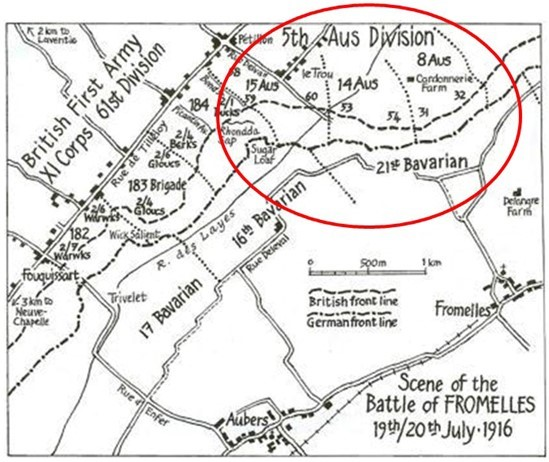
They were then relieved by the 4th Battalion New Zealanders on 16 July. The original plan for the attack at Fromelles was on the 17th, but bad weather caused it to be postponed.
Alex was back into the trenches and in position at 4.00pm for an attack on the 19th. The assault began at 5.58pm and was in four waves, with the D Company platoons in the 3rd and 4th waves. According to the AWM War Diaries:
“Just prior to launching the attack, the enemy bombardment was hellish, and it seemed as if they knew accurately the time set.”
The Australian pre-battle bombardment had a big impact on German first line trenches and the 31st quickly advanced to the second line, which was mostly just ditches filled with water. Even with the initial support, they remained under heavy artillery fire from both sides.
Unfortunately, with their successful advances, ‘friendly’ artillery fire caused a large number of casualties. The Allied forces were able to take out a German machine gun in their early advances, but they were being “seriously enfiladed” from their left flank. Fighting continued throughout the night, with heavy firing from concealed machine guns from Delangre Farm and nearby houses.
At 5.30am, the Germans attacked from both flanks in force and with bombing parties. Having only a few grenades left, the only resistance the 31st could offer was with rifles:
“The enemy swarmed in and the retirement across no mans’ land resembled shambles, the enemy artillery and machine guns doing deadly damage.”

The 31st were out of the trenches by the end of the day on the 20th. The headcount was just 512 soldiers of the 979 who began the battle.
Alex was one of those many casualties. He was 21 years old.
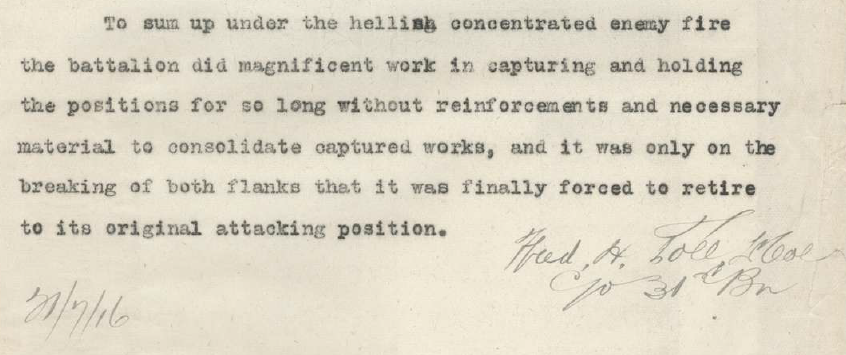
The bravery of the soldiers of the 31st was well recognised by their own Battalion commanders and Lt. General Haking.
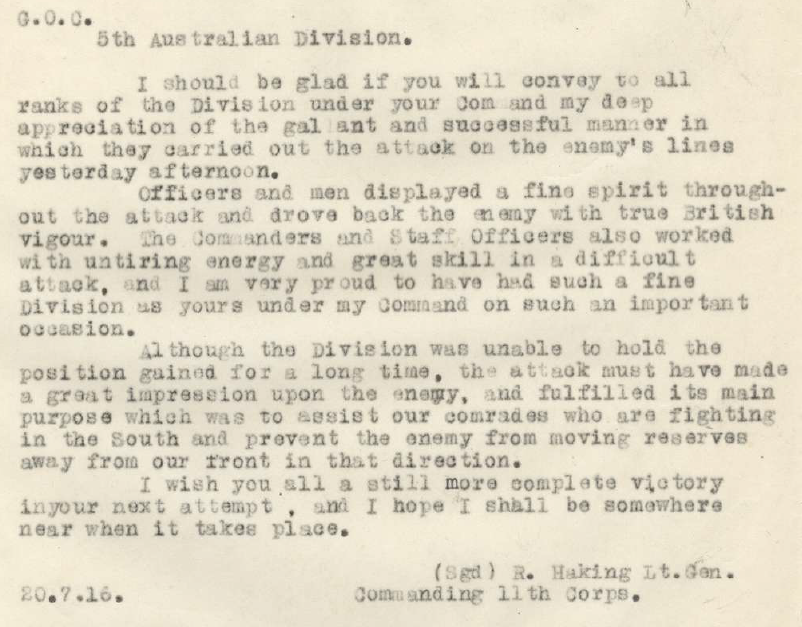
Burial in France
There are few specifics about Alex’s death, but his body was recovered by the Australians, as opposed to the many unfortunate soldiers who had to be left in No Man’s Land.
His death was documented as being on 21 July in the Battalion’s records, but this is believed to be the date the records were filed, not when he died. A number of soldiers have similar documentation.
Back home in Australia, his family and “dearly beloved friend”, Maude Jolly, mourned his loss and as noted in his memorial notice, he was “Loved by all who knew him”. The family named their house Wandilla , in his honour.
Alex is buried in the ANZAC Cemetery, Sailly-sur-La-Lys, Plot 1, Row H, Grave 1, about 7 kilometres from the battle site.
Alex was awarded the 1914-15 Star, British War Medal, Victory Medal as well as a Memorial Plaque and a Memorial Scroll. He is also commemorated in the Australian War Memorial Roll of Honour, panel number 119.
Maude later married another returned soldier, Arthur Charles Gladman, and together they had 4 children. Maude passed in Ballarat in 1985 aged 89.
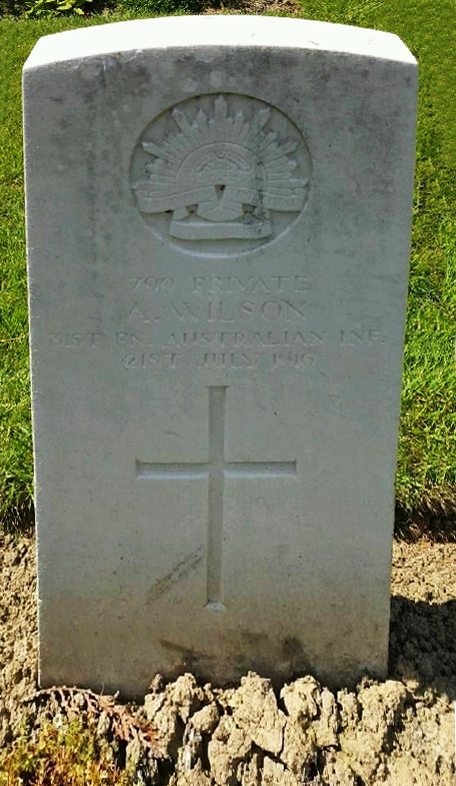
A tragic loss of such a promising young man.
Epilogue – the Message in the Bottle and Alex’s Harrier mates
In remembering that letter in a bottle, thrown into the ocean by a group of adventurous Ballarat boys, it is important to note that the young men who signed their names to that postcard paid dearly for their experience of war.
- Fred Rawlings and Alex Wilson were killed at Fleurbaix (Fromelles) in July 1916;
- Charlie Coutts and Wallie Hicks were killed in action at Polygon Wood in September 1917;
- Charles Walker Tucker died of wounds received during the Battle of Mont St Quentin on 3 November 1918
- of the remaining nine soldiers, all but two were wounded in action.
And regarding his Ballarat Harrier mates – Frank and Herb Collins – both survived the Battle of Fromelles but were wounded later in the war.
Links to Official Records
The Fromelles Association would love to hear from you

Contacts
(Contact: carla@fromelles.info or geoffrey@fromelles.info).
(Contact: army.uwc@defence.gov.au or phone 1800 019 090).
Donations
If you are able, please contribute to the upkeep of this resource.
(Contact: bill@fromelles.info ).
